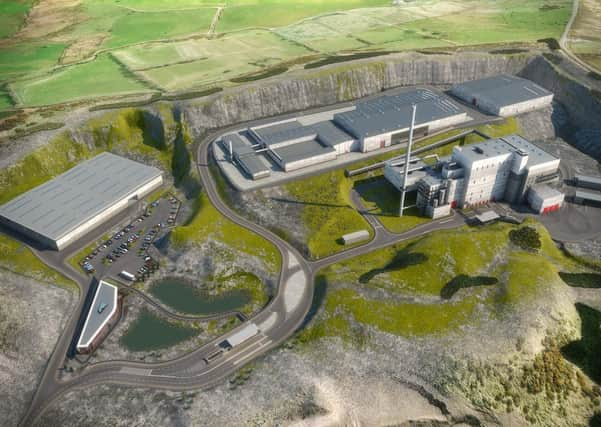‘NI drifting towards waste crisis,’ arc21


The £240m project earmarked for the Boghill Road is designed to deal with waste from a significant portion of the province’s population.
According to its 2020-2024 corporate plan, arc21, which is made up of six local councils including Antrim and Newtownabbey Borough Council, believes “existing arrangements will become not only unsustainable, but also increasingly expensive and will not meet the needs of a modern, 21st century economy”.
Advertisement
Hide AdAdvertisement
Hide AdThe group believes the coronavirus pandemic has also reinforced the need for “urgent action” to ensure the sector has the resilience to meet future shocks.
Tim Walker, arc21’s acting chief executive, said: “Northern Ireland is drifting towards a waste crisis because we do not have enough local facilities to treat non-recyclable household waste, let alone our commercial and industrial waste.
“At present we rely on landfill and waste exports to solve the problem, but both options may be unavailable within the decade. Northern Ireland has already committed to a 10 per cent cap on the amount of waste we send to landfill and several export markets have already closed or imposed punitive taxes on waste.
“The arc21 region produces the equivalent of 15 million black bins’ worth of household waste every year. That’s 15 million reasons to say yes to new facilities at Hightown that will give us breathing space to transition to a fully functioning circular economy whilst removing the potential risk of a systemic failure in household waste services.
Advertisement
Hide AdAdvertisement
Hide Ad“Located in a quarry near one of Northern Ireland’s largest logistics and industrial hubs at Mallusk, the site also offers excellent opportunities to utilise the energy generated to support new green businesses.”
Mr Walker continued: “We can’t keep repeating the inaction of the past. The failure to provide proper infrastructure for managing residual waste needs to be addressed with the same focus and sense of urgency that defines the debate over gaps in critical infrastructure such as Northern Ireland’s wastewater services.”
The proposals for the Boghill Road development have faced opposition from residents and political representatives since they were first mooted in 2013. Community group NoArc21 was established to highlight residents’ concerns.
The Department for Infrastructure announced in September 2017 full planning permission had been granted for the facility at the Hightown Quarry site. However, in 2018 the Court of Appeal ruled Stormont officials did not have the legal authority to grant permission for the facility.
Advertisement
Hide AdAdvertisement
Hide AdFollowing a meeting with representatives from NoArc21 over the summer, Agriculture, Environment and Rural Affairs Minister Edwin Poots said: “I will take full consideration of the matter in the context of the ongoing planning process for the Hightown facility and of the strategic and long-term needs for waste management and the circular economy in Northern Ireland.
“While I am currently not convinced, I am convincible.”
The proposed plant includes mechanical and biological treatment, energy from waste thermal treatment and incinerator bottom ash treatment facilities, plus a refuse-derived fuel bale storage building and an administration/visitor centre.
Robert Gibson, chairman of arc21’s joint committee and a member of Ards and North Down Council, said: “The pandemic has reminded us that the primary reason for efficient waste collection and disposal is to protect public health, but it has also highlighted a lack of resilience in Northern Ireland’s waste infrastructure.
“We just don’t have enough facilities locally to manage our waste, including clinical waste, without relying on exporting the problem or by using our quickly diminishing landfill capacity.
Advertisement
Hide AdAdvertisement
Hide Ad“We need major transformative change and a revolution in attitudes if we are to reduce carbon emissions to net zero by 2050 and develop our circular economy. Other regions in Europe have already demonstrated how sustainability can be delivered.”
Click here to read: Anti-incinerator campaigners voice concerns in virtual meeting with environment minister
--
Thank you for reading this article. We’re more reliant on your support than ever as the shift in consumer habits brought about by coronavirus impacts our advertisers. Please consider purchasing a copy of the paper. You can also support trusted, fact-checked journalism by taking out a digital subscription of the News Letter.